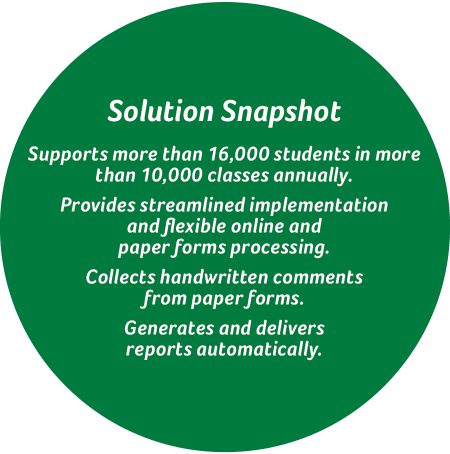A public university with more than 16,000 students, Mississippi State University (MSU) uses Class Climate from Scantron to conduct faculty evaluations for nearly 10,000 classes annually. With the automated course evaluation system, MSU has eliminated labor-intensive processes—saving nearly two months of staff time each semester—while providing more robust, accurate information to faculty and administrators.
The Challenge
 The mission of MSU’s Office of Institutional Research is to provide accurate, appropriate and timely information to decision makers. Yet, as demands for data grew more sophisticated, the office found the university’s faculty evaluation system was becoming cumbersome and laborious.
The mission of MSU’s Office of Institutional Research is to provide accurate, appropriate and timely information to decision makers. Yet, as demands for data grew more sophisticated, the office found the university’s faculty evaluation system was becoming cumbersome and laborious.
“We wanted to completely revamp faculty evaluations,” said Julie Fulgham, director of the Office of Institutional Research (Retired). “Instead of one form with 10 questions, we wanted to create five different forms, customized for each type of course.”
However, the process was not easy. “Our old system used preprinted forms. Customizing the questions would’ve been costly,” said Fulgham.
The university also faced other challenges. Faculty evaluation packets took two months to prepare. Staff had to write software code to generate the evaluation forms and reports, which were available only on paper. In addition, the system could not process students’ handwritten comments.
“We wanted a solution that would allow us to quickly and easily design survey instruments, administer them on paper or online, and provide data analysis and reporting in several formats,” said Fulgham.
Enter Class Climate, Scantron’s automated course evaluation and survey solution, with customizable survey creation, flexible forms processing, support for handwritten comments, and automated reports.
The Solution
Class Climate enabled MSU to process a high volume of evaluations without the time and expense of laborious data collection and reporting.
“We purchased Class Climate to make the faculty evaluation process more efficient in terms of both cost and human resources,” said Fulgham. “Implementing Class Climate was a breeze.”
Today, MSU uses Class Climate to conduct paper-based evaluations for lecture, studio, discussion, lab and continuing education classes. Each type of class has a unique evaluation form. In addition, MSU administers web-based surveys to students taking online courses.
“In two days, we have all the course evaluation packets used to take nearly two months using our old system. The real savings with Class Climate has been in time.”
Julie Fulgham, Director, Office of Institutional Research (Retired), Mississippi State University
MSU evaluates approximately 5,000 class sections for nearly 800 faculty members each semester. Class Climate analyzes the raw data and prepares a graphical report, which is automatically e-mailed to instructors after the semester ends.
“With our previous system, we had to write code to generate survey results,” said Fulgham. “The faculty got a one-page report that had only the mean and standard deviation for each question. Class Climate significantly enhances our reporting. The data is well organized and the faculty loves receiving their results via e-mail.”
Class Climate also saves time by enabling instructors to easily review handwritten comments. Says Fulgham, “To read students’ handwritten comments, faculty had to go through the evaluation sheets one by one. With Class Climate, they can simply scroll through the report, which is more convenient.”
 In addition to enhanced reporting, MSU has realized substantial gains in the preparation, distribution and processing of faculty evaluations.
In addition to enhanced reporting, MSU has realized substantial gains in the preparation, distribution and processing of faculty evaluations.
With Class Climate, MSU now has the flexibility to change survey questions as needed. The Office of Institutional Research simply e-mails the form files to the campus printing department which prints and delivers them shrink-wrapped, in order by course section.
“In two days, we have all the course evaluation packets assembled and ready to go to the faculty,” said Fulgham. “This process used to take nearly two months. Now we can release our data analysts and programmers from writing code to generate forms and reports, and free up our professional research staff from stuffing envelopes day after day.”
Data accuracy has improved as well. “We don’t know how accurate our data was before because we had no validity testing,” said Fulgham. “Class Climate allows us to view every question and response, so I know our data is accurate.”
As MSU continues to use and benefit from Class Climate, it looks forward to expanding its use for assessing institutional effectiveness. “Soon we’ll have additional surveys to administer on paper and online,” said Fulgham. “For example, our executive enrollment management committee recently wanted to know about graduates’ career placement. With Class Climate, we can easily survey graduates, via mail or e-mail, to measure the placement rates for each college. We also plan to conduct surveys to gather student and employee perceptions of the university. Class Climate is going to be a big enhancement to our efforts.”
Scantron is proud to help this university save time and effort on course evaluations.


